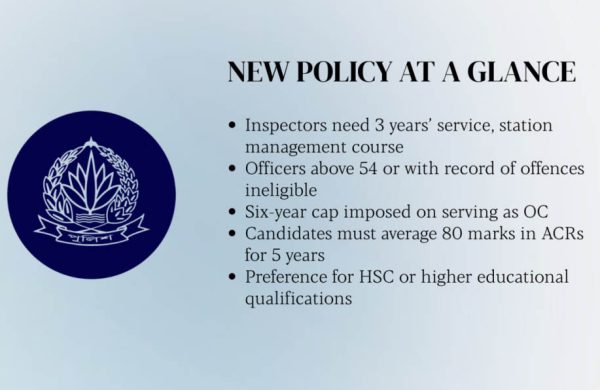Police adopt stringent criteria to select OCs
- Update Time : Monday, September 15, 2025

TDS Desk:
A new policy has been introduced for selecting officers-in-charge of police stations, outlining stringent eligibility criteria for inspectors aspiring to secure the coveted post, widely regarded as a seat of power within the force.
Senior officials say the policy is designed to ensure transparency and merit-based selection for a role that has long been marred by political interference and corruption. An OC commands significant power, with the authority to oversee investigations and manage resources at a police station.
“Only those officers with solid service records, relevant experience and good conduct will make it to a list from which OCs will be chosen according to seniority,” said an officer involved in drafting the policy.
Approved recently by Inspector General of Police (IGP) Baharul Alam, the new policy stipulates that an officer can hold the post of OC for a maximum of six years.
The move comes around five months before the country is expected to go to the national election in which OCs will play a key role in maintaining law and order.
There are 530 police stations under eight ranges, 110 stations in eight metropolitan police units and 24 railway police stations across the country.
According to the new policy, only those officers who have served as inspectors for at least three years and completed a police station management course will be considered for inclusion in the list.
Officers above the age of 54 will be ineligible for the post, while those with HSC or higher educational qualifications will be given preference.
Punishment for financial irregularities or moral turpitude at any point during service will render a police officer ineligible for the position.
If an officer is punished twice or more while serving as an inspector or punished thrice or more previously for major offences, the officer will not be considered for selection.
Also, an officer will be disqualified for the post if punished for a minor offence within a year or for a major offence within two years prior to selection.
Candidates have to score an average of 80 marks in their Annual Confidential Reports (ACRs) for five consecutive years and must not have any negative remarks from evaluators in ACRs for three years in a row.
On July 3, the police headquarters circulated the policy, signed by IGP Baharul Alam, to all unit chiefs for implementation.
“The policy aims to ensure selection of highly professional officers as OCs,” IGP Baharul Alam told Journalists recently.
He further said that many influential people, including political leaders, often lobby for certain officers to have them selected as OCs at preferred police stations. The new policy will help curb this.
Several police officials told this newspaper that during the Awami League government’s tenure, officers loyal to the ruling party secured “lucrative” postings under Dhaka Metropolitan Police (DMP).
At that time, both loyalty and lobbying played a decisive role in determining postings, particularly at strategically important stations. There were numerous allegations of officers bribing their superiors to secure postings. Some officers even exploited political links to accumulate wealth, they said.
In a confessional statement to a magistrate on March 24, former IGP Chowdhury Abdullah Al-Mamun, now on trial over crimes against humanity during the July uprising, said political interference in the police force intensified after 2018.
He alleged that a section of officers largely ignored directives from the IGP, believing they had political backing to act independently. Some even had close ties with senior leaders of the ruling party.
Giving an indication of the powers wielded by these officers, Mamun said that several OCs of police stations under DMP, along with senior officials, used to attend important meetings that took place at the residence of former home minister Asaduzzaman Khan.















